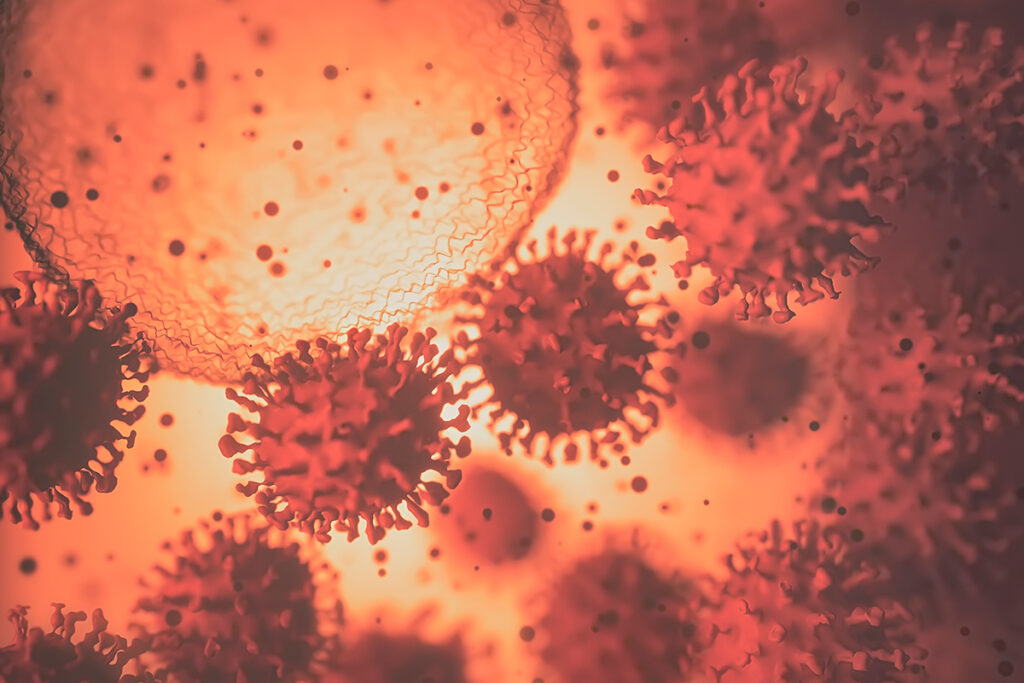Most often, the coronavirus infects the lungs. However, up to 57% of patients with COVID-19 suffer from the intestinal form of the coronavirus.
The most common symptoms of COVID-19 from the gastrointestinal tract (GI tract):
- diarrhea;
- nausea, vomiting;
- loss of appetite;
- loss of taste;
- stomach ache.
Patients with gastrointestinal symptoms of COVID-19 suffer from more severe fever, fatigue, shortness of breath, and headaches.
ACE2 in the gastrointestinal tract
The main target of the SARS-CoV-2 coronavirus is the ACE2 protein. Although ACE2 predominantly expresses alveolar epithelial cells in the airway mucosa, various GIT cells also express this protein. The highest expression of ACE2 is found in enterocytes of the small intestine, colon, and duodenum. Compared to the respiratory tract, levels of ACE2 expression in colon enterocytes can be up to 100 times higher.
Intestines
By binding to the ACE2 receptor in the gastrointestinal tract cells, SARS-CoV-2 can disrupt the intestinal barrier function and cause inflammatory reactions such as the release of cytokines and the migration of immune cells to the site of infection.
Some of the effects of cytokine production in the gastrointestinal tract:
- dysbiosis;
- exacerbation of intestinal inflammation;
- damage to the intestinal mucosa barrier.
Liver
Bile duct epithelial cells cholangiocytes also express ACE2. ACE2 protects the liver from inflammation. Studies have shown that removing this protein aggravates non-alcoholic fatty liver disease, oxidative stress, and inflammation in the liver. When infected with COVID-19, ACE2 expression is reduced. It can lead to liver dysfunction, especially in patients with underlying liver disease.
Liver dysfunction in COVID-19 may be indicated by:
- hypoalbuminemia – low levels of albumin, the main protein in human blood plasma;
- prolonged prothrombin time – the time of clot formation after the addition of the reagent to the plasma;
- hyperferritinemia – an increased level of the intracellular protein ferritin, which is responsible for the accumulation and release of iron;
- increased expression of biomarkers of liver dysfunction: aspartate transaminase (AST), alanine aminotransferase (ALT), gamma-glutamyl transferase (GGT), and alkaline phosphatase (ALP).
Pancreas
ACE2 plays a protective role in the pancreas by increasing the levels of the pro-inflammatory biomarkers IL-6 (interleukin-6) and IL-8 and increasing the cytokine IL-10, which has anti-inflammatory properties.
SARS-CoV-2 can enter the pancreas. It primarily infects β-cells that produce insulin. In this case, the production of insulin decreases, and the infected cells die. COVID-19 permanently disrupts glucose metabolism.
Increased serum levels may indicate damage to the pancreas in COVID-19:
- amylase – an enzyme that breaks down starch;
- lipase – an enzyme involved in the breakdown of fats.
Type III interferons are urgent to suppress coronavirus in the intestine
Nearly all cells in the body produce and respond to type I interferon (IFN) to enhance their antiviral response. The response of epithelial cells of the lungs and intestines to viral infection also depends on type III IFN. The type III interferon receptor is expressed mainly by epithelial cells. That explains the unique role of IFN III in the antiviral protection of the epithelium and mucosal surfaces.
During intestinal viral infection, IFN I is required to protect against the systemic spread of the virus. In contrast, IFN III protects intestinal epithelial cells, limiting the exacerbation of the immune response. Pretreatment with both IFN I and IFN III inhibits infection and replication of SARS-CoV-2 in intestinal epithelial cells.
However, for protection against viral infection, endogenous IFN III is critical. When infected with SARS-CoV-2, the primary epithelial cells of the human intestine secrete IFN III. Depletion of the IFN I receptor leads to only a slight increase in the number of infected cells, while when the IFN III receptor is depleted, the number of infected cells increases sevenfold. The same result occurs when both types of IFN receptors are finished.
Scientists at the University of Heidelberg in Germany have shown that endogenous type I interferons play a minor role in suppressing SARS-CoV-2 infection, but endogenous type III interferons are important for stopping the spread of the virus in intestinal cells.
Research results:
- Endogenous type III interferons inhibit the replication and spread of SARS-CoV-2 in intestinal epithelial cells. At an early stage after infection (4-8 hours), both cells lacking the IFN I receptor and those lacking both IFN I and III receptors were significantly more infected than wild-type cells and cells lacking only the IFN III receptor. In contrast, at a later stage after infection (12-24 hours), cells lacking an IFN III receptor were more infected than cells lacking an IFN I receptor. It means that both IFN I and III are important for suppressing SARS-CoV infection. -2 in the intestine, but IFN I may play a more significant protective role at an early point in time than IFN III. Conversely, it is more important to protect against SARS-CoV-2 in the later stages after infection with IFN III. Both interferons act on intestinal epithelial cells with different kinetics and interfere with varying stages of the SARS-CoV-2 life cycle (penetration and replication in primary infection versus spread and secondary infection).
- Type III interferon at lower concentrations and faster suppresses SARS-CoV-2 than type I interferon. While IFN I and III triggered an antiviral response against SARS-CoV-2 at high concentrations, lower concentrations and shorter pretreatment with IFN III were sufficient to suppress viral infection.
- The antiviral activity of type III interferon from SARS-CoV-2 lasts longer than type I interferon when cells are treated before infection. IFN III can have a long-term effect, inducing an antiviral state even 72 hours after treatment.
Conclusions
Both types I and III interferons act quickly and prevent viral replication and spread even when administered after infection with SARS-CoV-2. IFN III has a long-lasting effect and is more effective in inhibiting SARS-CoV-2 compared to IFN I. The use of type III interferons may have great potential for eliminating SARS-CoV-2 infection in the human intestine.
Useful article, necessary information? Share it!
Someone will also find it useful and necessary:
Sources
- Increased sensitivity of SARS-CoV-2 to type III interferon in human intestinal epithelial cells
- COVID-19 and the Gastrointestinal Tract



